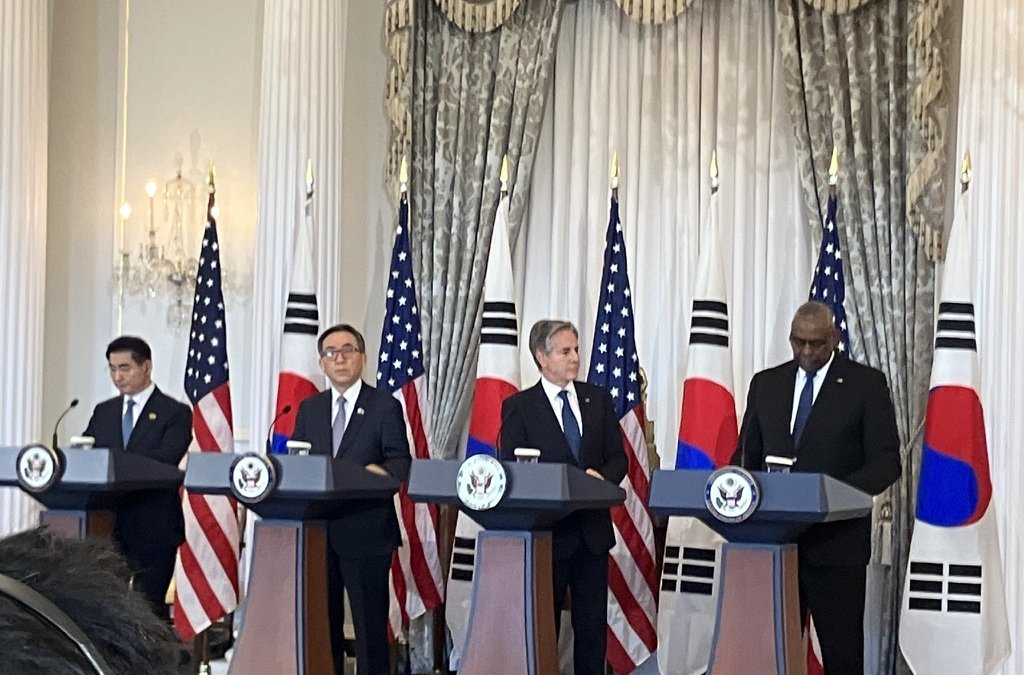WASHINGTON — Officials from the United States and South Korea jointly called for North Korea to end its recent military aid to Russia on Thursday following a diplomatic meeting between the two nations’ top defense officials.
“Putin has been throwing more and more Russians into a meat grinder of his own making in Ukraine,” said Secretary of State Antony Blinken, one of four speakers at a press conference following the meeting. “Now he’s turning to North Korean troops and that is a clear sign of weakness.”
North Korean leader Kim Jong Un has sent about 10,000 troops to Russia with 8,000 in the Kursk-Oblast region on Russia’s border with Ukraine, according to Blinken.
The summit took place soon after the DPRK test-launched an Intercontinental Ballistic Missile (ICBM) on Thursday morning local time.
South Korean Foreign Minister Cho Tae-yul said the test violated the United Nations Security Council’s resolutions on North Korea. The resolutions, passed in 2016, condemned “North Korea’s latest nuclear and ballistic missile activity and calls on North Korea to cease its illicit activity.”
In reaffirming the two countries’ over 70-year-old relationship, the four leaders – including South Korean Defense Minister Kim Yong-hyun and U.S. Defense Secretary Lloyd Austin – emphasized their commitment to “the goal of complete denuclearization of the DPRK.” Cho doubled down on enforcing North Korea sanctions by strengthening allied coalitions. However, he also emphasized the gravity of the new development in their relationship with Russia.
“The DPRK’s troop dispatch will further prolong Russia’s illegal war of aggression against Ukraine and place not only the Korean Peninsula but also Europe’s peace and security under a grave threat, a view that we shared,” Cho said.
Russia and North Korea’s relationship has strengthened after Russian President Vladimir Putin and Kim Jong Un signed a treaty in June pledging to help each other if either country encounters “aggression.”
The transfer of troops was not just a gift between allies, though. U.S. Defense Secretary Lloyd Austin said he didn’t see any sign of Russian technology used in the ICBM, but it’s unknown what the DPRK received for sending troops. He said a technology transfer “could be and would be destabilizing.”
James M. Lindsay, a Senior Fellow in U.S. foreign policy at the Council for Foreign Relations, agreed. Artillery shells given to Russia lose their use after they explode, but intelligence or technological information could be “the gift that keeps on giving” for Kim-Jong Un.
“It can lead to the rapid improvement of military forces that the United States worries about potentially engaging in the future conflict,” Lindsay said.
Blinken confirmed that Russia has trained the DPRK soldiers in “artillery operations, UAV operations and basic infantry operations” plus providing them with Russian uniforms. He said the troops have not been deployed into combat yet, but are expected to be in the coming days.
Blinken and Austin both said the troops would be “legitimate military targets” if deployed.
When asked if continued North Korean aggression might lead to a change in operational plans between the two countries, Austin would not commit to specifics.
However, he emphasized the two allies would remain vigilant.
“We are constantly planning and upgrading our plans, and working to make sure that we are ready to fight tonight– if it comes to that,” Austin said.

